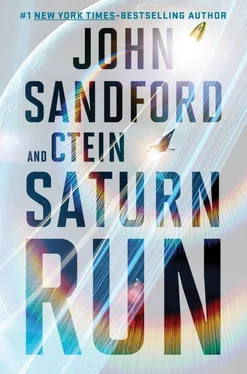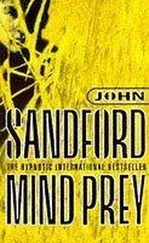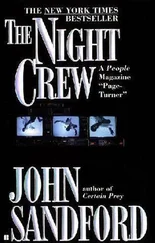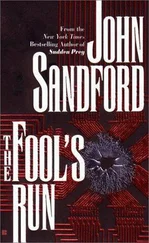“Cui, tell Maintenance to have the team in the bay finish what they’re doing and strap down. This is going to get bumpy.”
Again.
He’d pressed the geniuses on Earth to provide a better set of navigation parameters for the next pass through Saturn’s atmosphere. They’d been both sympathetic and largely unhelpful. Their computer models still suggested much the same trajectory and angle of attack that had caused them grief on the first pass.
Chedan!
From their viewing ports, Saturn looked less like a planet than a landscape. The horizon line was nearly flat at this close distance, the cloud tops below them streaked with tawny shades of yellows, oranges, and dusty greens. Far ahead, the broad bands of the ring system filled the rest of the sky, their knife-like precision contrasting sharply with the fuzzy fringes of Saturn’s atmosphere. The whole image looked unreal, an airbrush fantasy.
Cui said quietly, “Here we go.”
The ship began to vibrate; just a bit for the first few seconds, then more strongly. The view through the port was obscured by a faint reddish haze that quickly yellowed and brightened, and negative gee forces pulled the crew forward in their seats.
The incandescent plasma sheath made the ports almost too bright to look at. Atmospheric friction did its job, converting the kinetic energy of the Celestial Odyssey into heat and sound. The scream of the wind penetrated the hull as a rattling roar. For minutes that seemed much too long, the cacophony continued, then the ship bucked violently, and simultaneously a new alarm fired.
Through chattering teeth, Zhang called, “Helm, status.”
“We’re losing more pieces of the external tanks! I don’t think they’re going to hold.”
“Navigation, how much more of this?”
“We’re most of the way through, sir. Another two minutes and we’ll have shed enough velocity to handle the rest of the re-orbiting on our own.”
“If we make it that long,” Zhang whispered to himself. If they didn’t burn up. Even if they didn’t burn up, they might not have external tanks. If that was so, he thought, We are screwed .
Time dragged on, until it seemed impossible that the ship wouldn’t fly apart: but it didn’t. Gradually the buffeting diminished, the incandescent glow outside the windows dimmed, and the roaring wind quieted.
The Celestial Odyssey was free of Saturn’s atmosphere for a second time.
Zhang: “Navigation, you have a burn that will normalize our orbit?”
“Relaying it to the helm now, sir.”
“When you can, Helm, if you will.”
Peng: “Acknowledged, sir.”
A moment later he initiated the command sequence. Thrusters fired, rotating the ship one hundred eighty degrees. The main engines cut in, ten huge columns of blue-white-hot hydrogen plasma jetting from the rocket nozzles into space ahead of the ship. The Celestial Odyssey , much lighter than it had been when it left Earth, decelerated at a steady half gee. Fifteen minutes of this would have the ship in a much tighter orbit, from which they could work their way into the Maxwell Gap.
“Mr. Cui, what’s our status? Just the high points, if you will.”
The first officer scanned the ever-lengthening list of status summaries scrolling onto her screen. Maintenance had nothing new to say about the external tanks, but it was assumed that they were pretty much useless. Worse than useless, dead weight—they’d have to be cut away from the ship to reduce its mass before they returned home.
“Sir, I…” Then she stopped and turned pale. It took her just a fraction of a second to collect her thoughts, but the rest of the crew caught her hesitation. The bridge went silent.
“Captain… Engineering reports that we lost… we lost containment on the downside hangar bay. The seals on the doors failed. Thermal stress plus physical shock…” She shook her head violently and resumed in a stronger voice. “The bay depressurized. Maintenance has been unable to raise the work crew.”
Zhang: “Comm, get me a feed, now!”
A virtual screen flicked into visibility, mid-bridge. Everything looked intact in the bay. No equipment had shaken loose from its tie-downs. The doors appeared solid. It was a deceptive appearance. Toward the forward end of the bay, four figures floated in harnesses tethered to the wall. Unmoving figures.
“Get a medical team to the bay! Now! Now!”
“On their way, sir, but I don’t think it’s going to make any difference,” Cui said. “The data stream says the bay depressurized ten minutes ago.”
O jiangui, thought Zhang, o jiangui, o jiangui…
The transfer of the memory modules and the readers was routine. The eight modules looked like 2.5-centimeter carbon-fiber dowel rods, each twenty centimeters long, with a needle-thin, gold-colored metallic strip on one side. The strip was gold-colored because it turned out to be gold. The rods looked like carbon fiber, because analysis showed that each module had a carbon fiber shell.
The readers looked vaguely like office paper-printers, black cubes that measured fifty centimeters in each of the three dimensions, with rubber-like legs at each corner of the bottom. The top had a slot that would take a memory module.
The readers ran on direct current electricity but had an alien I/O port. Converter ports would have to be fabricated. Wurly interrupted the regular I/O flow to the Nixon to insert an operating manual for the readers, along with instructions for converting the I/O port.
Each reader and each QSU module came in its own container, again, of carbon fiber. They were ferried back to the Nixon in a heated case built by Martinez and Sandy in the fab shop, one set at a time: Fang-Castro wouldn’t risk losing all of them at once, or even two of them at once, in a freak accident.
Sandy called Crow from the primary: “We got the last five and a half trade points. They gave us one point for the oboe and the bassoon, apparently there’re no double-reeds in their trading stock. Forking over most of the commander’s tea and Clover’s liquor got us three more points. Oh, yeah, and we got half a point for the music collection, although the trade computer discarded ninety-nine percent of it. John says we could learn more about our alien friends from what they kept and what they rejected.”
“We kept a record of what they took and what they let go?”
“Absolutely.”
“They keep Beethoven and Mozart?”
“No. They kept Bach, Vivaldi, some guys I never heard of from the late nineteenth century—Erik Satie?—then a twentieth-century group called Motörhead and some American Indian drumming songs, and most recently, a Russian group called Rape the Whirlwind. They didn’t take Kid Little, which tells you something about their taste.”
“Yes, it does, but I don’t care. What’d we get the other points for? Don’t tell me they went for those fake disks and the disk player.”
“Absolutely. The computer suggested that we could bring more of them, and get more points, but we have to wait sixty-four years.”
“Unbelievable.” When Martinez had learned that the trade computer was interested in archaic music machines, he’d fabricated a mid-twentieth-century disk player that played thirty-centimeter plastic disks through a crystalline pickup that vibrated according to an arrangement of grooves on the disk. He got the specs from a vintage recording club, and he and Sandy printed out everything but the pickup in a marathon five-hour fab session. The pickup was fashioned from a diamond-stud earring they extorted from the surveillance tech—“But they were given to me by my former fiancé”—and cut with a laser.
Читать дальше








